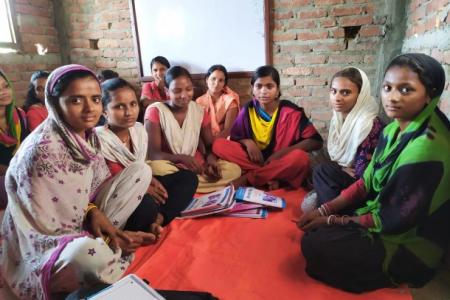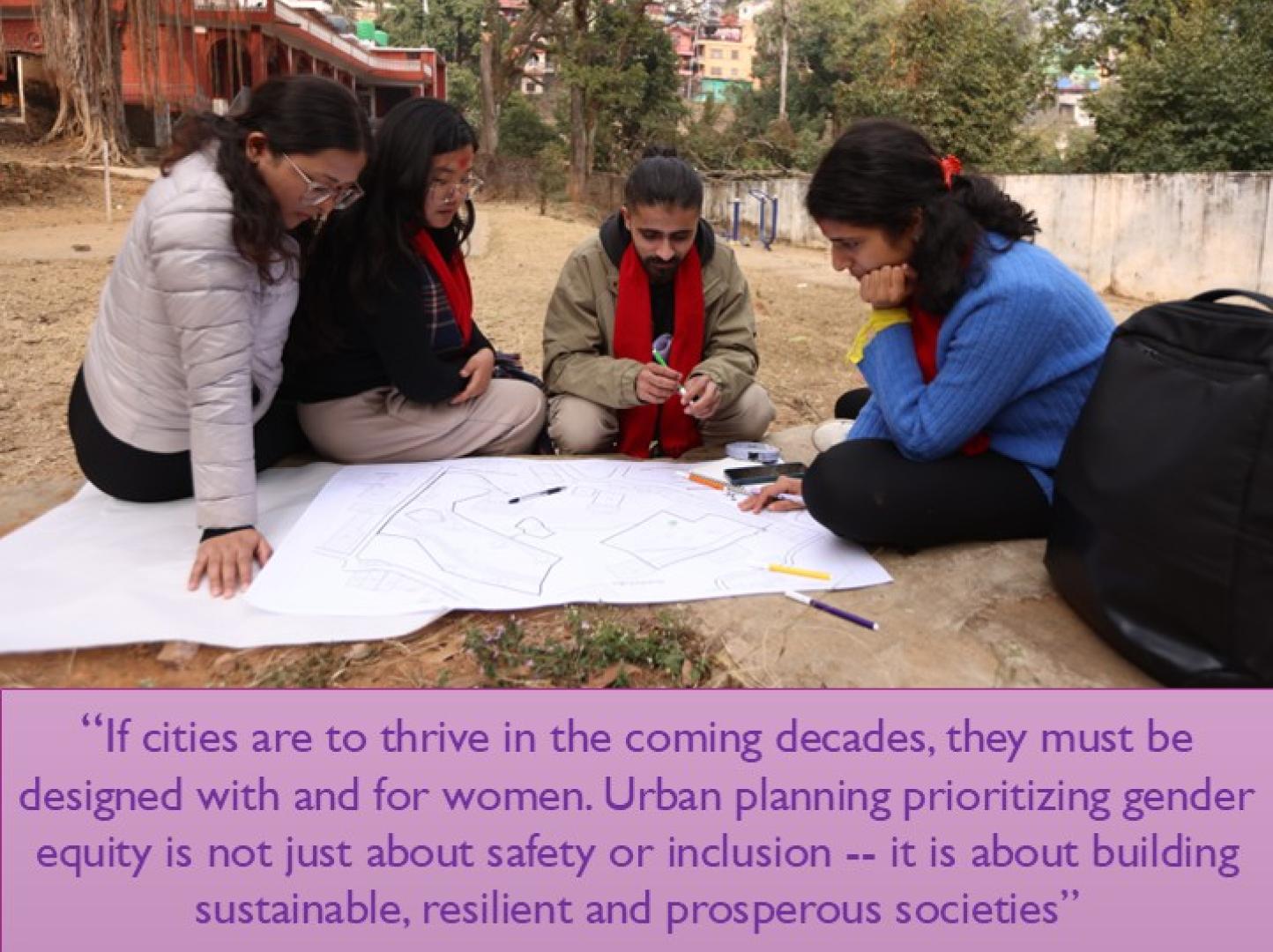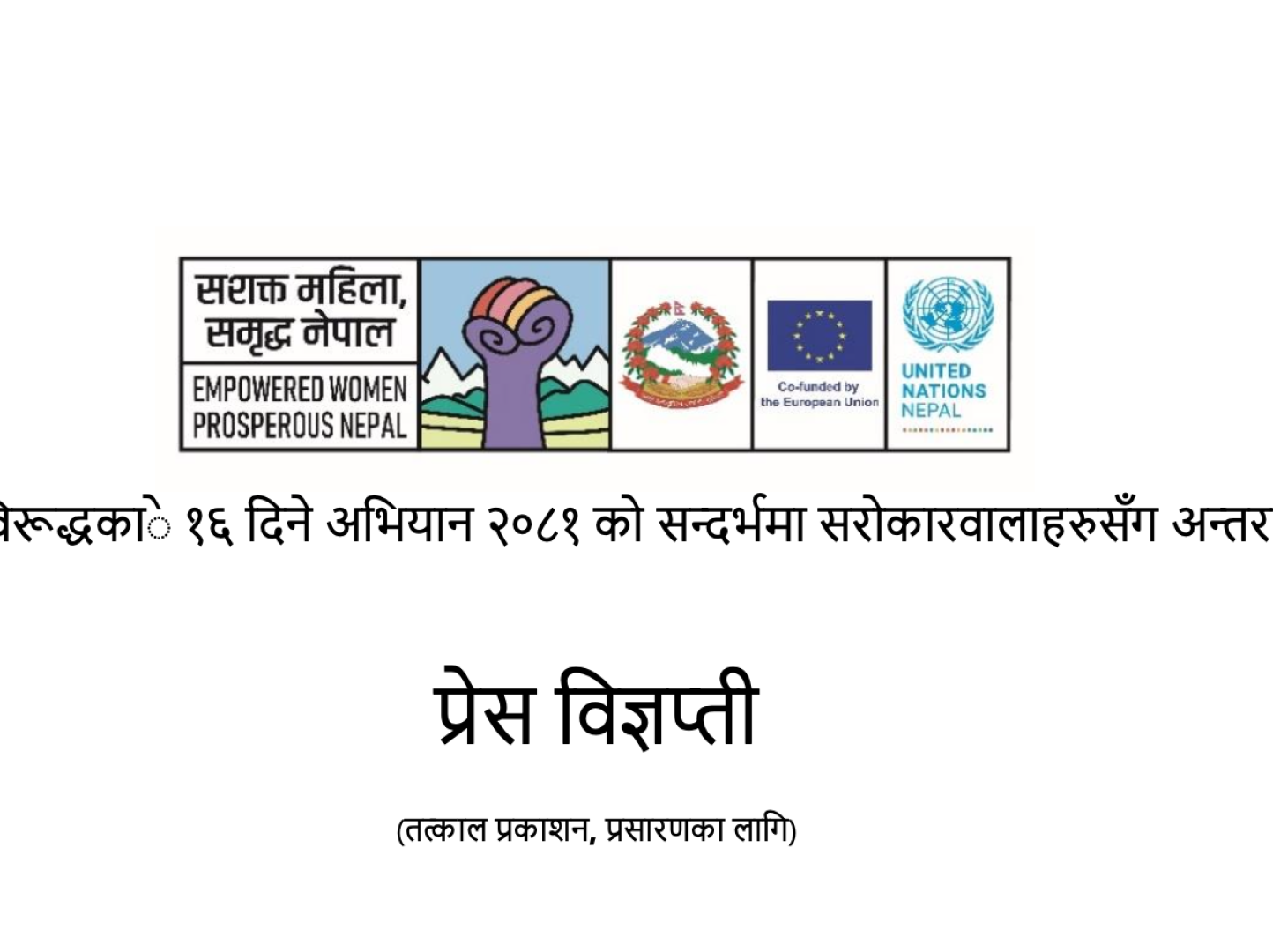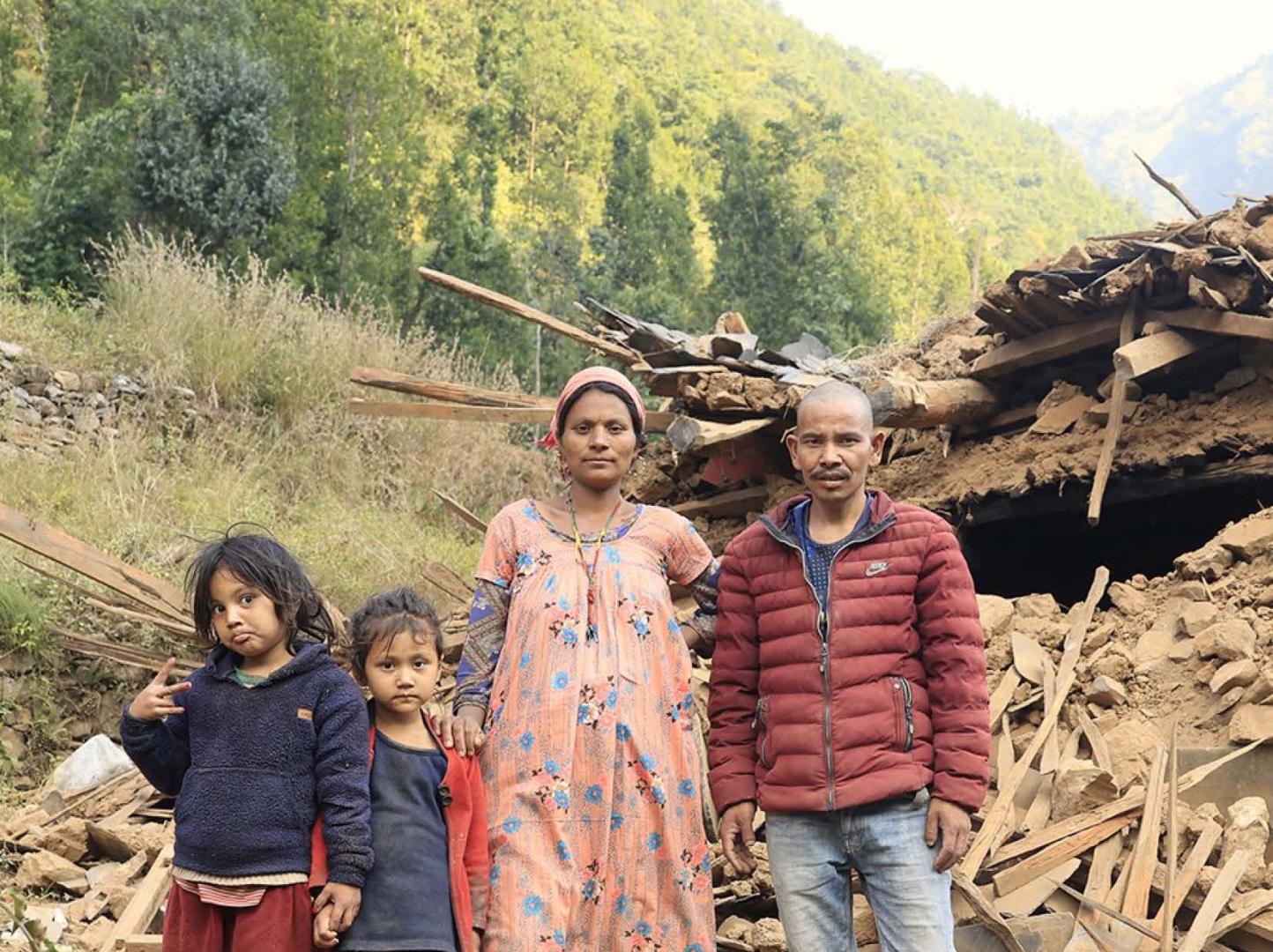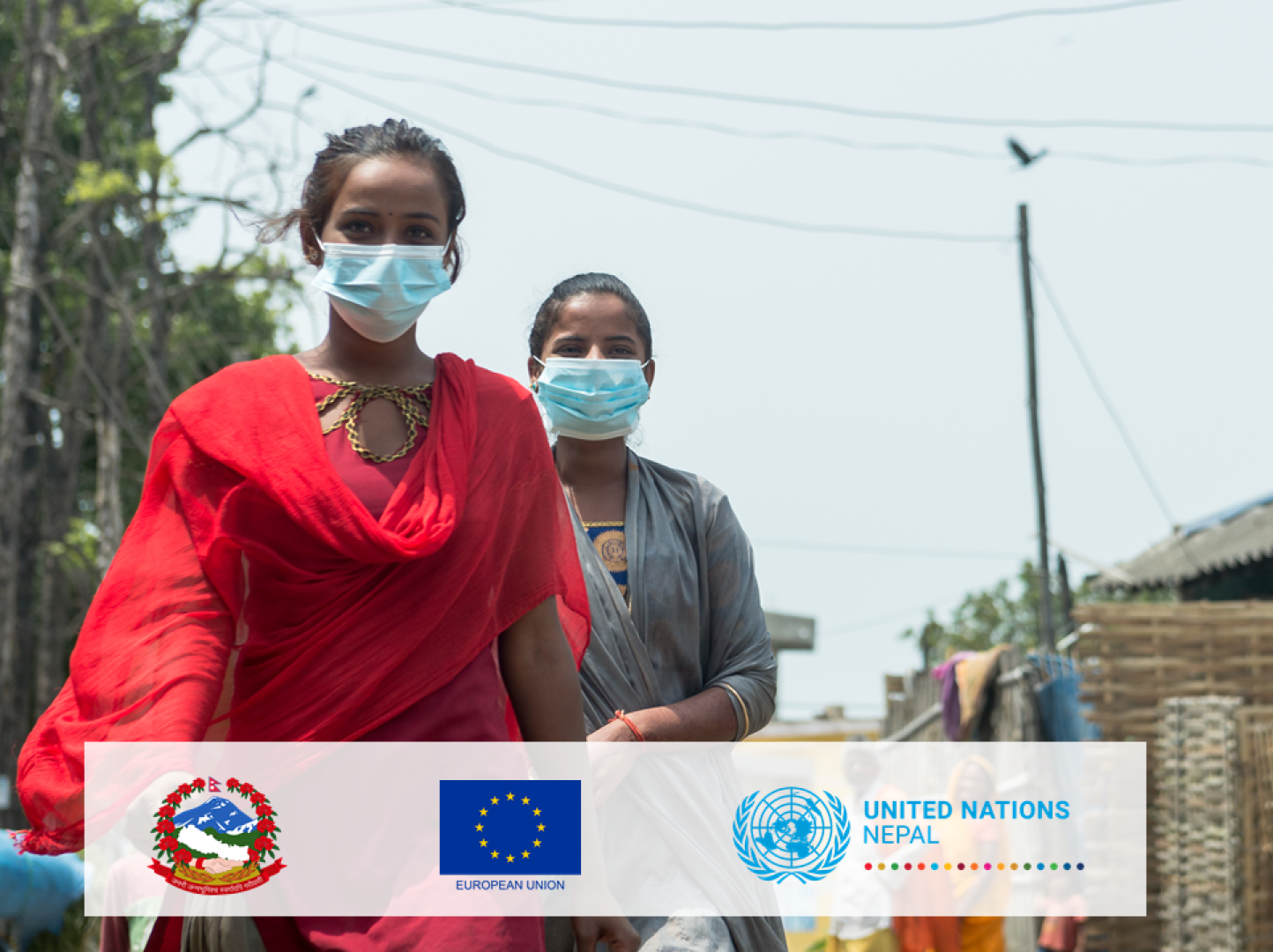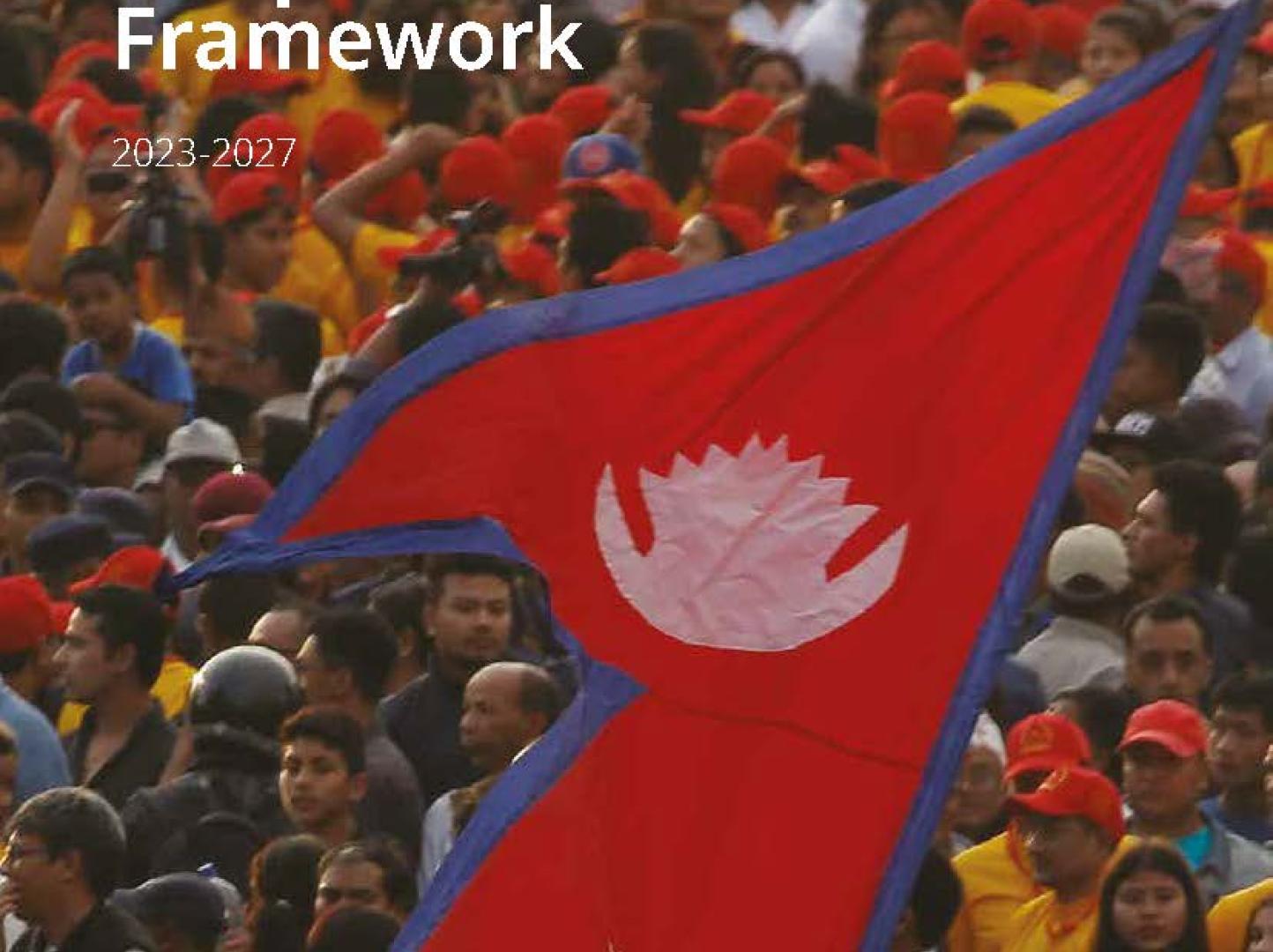Latest
Press Release
05 January 2026
UN in Nepal Advances Efforts to Survivor-Centered Protection from Sexual Exploitation, Abuse and Harassment Across Government Ministries
Learn more
Press Release
17 December 2025
Seventy Years of Partnership, Eighty Years of Multilateralism: Nepal and the United Nations Celebrate a Shared Legacy of Impact, Peace, and People
Learn more
Press Release
25 November 2025
Digital Violence Is Real Violence: UN Nepal Calls for Action as 16 Days of Activism Begins
Learn more
Latest
The Sustainable Development Goals in Nepal
Nepal committed to the SDGs early on, and this commitment has been reaffirmed in key policy documents, such as the current 15th Development Plan and the 25 Year Long-Term Vision 2100 that internalises the Goals. SDGs codes are assigned for all national development programmes through the Medium-Term Expenditure Framework. Further, Nepal has prepared the SDG Status and Roadmap to localize the SDG indicators with baselines and targets for 2030. Other key documents are a SDGs Needs Assessment, a Costing and Financing Strategy, and additional SDGs Localization Guidelines. Finally, Nepal has conducted a Development Finance Assessment (DFA) to provide an overview of development finance flows and institutions and policies that can align finance with national development priorities. These are the goals the UN is working on in Nepal:
Story
03 July 2023
UN Nepal Piloting PSEA Integration into Development Programming and UNSDCF Implementation
To prevent Sexual Exploitation and Abuse (SEA) at all levels and to ensure SEA is addressed as the top priority, the PSEA co-chairs in Nepal-UN Resident Coordinator Office and UN Women with the support from WHO- organized the first of its kind workshop on June 21-22 for the UN agency key focal points to capacitate them to integrate PSEA into the UN Sustainable Cooperation Framework (CF).
The workshop piloted by the UN in Nepal brought together 32 participants from the PSEA Working Group and the CF Outcome Working Groups. Jointly the participants identified opportunities for PSEA to inform and be integrated into CF outcomes, processes, and tools. The participants also prioritised a set of key actions and recommendations for the Outcome Working Groups, PSEA Network and the UNCT.
The 1.5-day workshop was facilitated by Lian Yong, Asia Pacific inter-agency PSEA Coordinator, together with Tej Maya Dangol, Nepal PSEA Coordinator and UN RCO and UN Women staff members.
Feedback from the workshop was positive, as it enabled key agency focal points time and space to think deeply about opportunities within their own agencies as well as collectively for the UNCT.
Lessons learned from this workshop will be taken and applied both at the regional Asia/Pacific level as well as globally. It is hoped that this pilot can be replicated in other contexts supporting the UN’s move from PSEA at the policy level to concrete actions at the ground level.
1 of 3
Press Release
03 December 2020
Oped : The challenges people with disabilities face
Richard Howard
The year 2020 has thrown unprecedented challenges at all of us, both in Nepal and globally. The pandemic has also impacted people disproportionally. Persons with disabilities that make up 15 percent of the world population, or one billion, are among the hardest hit by Covid-19. One in every five women is likely to experience disability in her life, while one in every 10 children is living with a disability. Of the one billion population of persons with disabilities, 80 percent live in developing countries. These numbers provide a backdrop for thinking about our response to Covid-19 and how we make a dedicated effort to ensure that people with disabilities are not left behind. We must ensure their inclusion in our response and recovery efforts.
Some disabilities are not visible. Chronic pain, mental illness, chronic fatigue are a few types of invisible disabilities that control people’s lives but do not show in obvious ways. These are people who are regularly told that their disabilities are not real, are made up for sympathy or only imagined and could not possibly be a real medical condition since they walk free from canes or crutches, have functioning limbs, and can seemingly move their bodies just like the rest of us. Society needs to be built so that it is accessible to everyone, including those with less visible disabilities.
Nepali society, like most societies, should promote greater understanding and increased accessibility for people with disabilities, who are often treated differently or excluded from the opportunities and conversations open to others. They are pressed to navigate a world that is not built for them. Kindness, compassion and consideration are a good start to ensure that we see and support those who may struggle and suffer in normal times and in times of crisis.
When this pandemic passes, the world must be a different place, and it is a chance to reimagine a society in which people with disabilities have better lives; where they do not have to fight to be seen and included, and where they are not merely an afterthought. People with disabilities should participate in our response and recovery from Covid-19 at all stages, and they should hold us accountable to deliver on our promises.
On this International Day of Persons with Disabilities, I hope that we can all begin to envision a society that everyone can participate in, one that changes how we see and interact with disabilities as equal partners, particularly those with invisible disabilities. It is a chance to build back better and challenge inequalities at every step.
A big step in the right direction is to break the silence, speak up and wipe away the biases held against people with disabilities, to banish the stereotypes, and slowly dissipate the stigma facing people with disabilities. These changes start with each of us making a commitment. There are myriad ways in which the world can transform to remove obstacles for people with disabilities to access the opportunities the rest have, from access to economic opportunity and healthy workspaces to accessible infrastructure and health services.
Richard Howard
Howard is the UN Resident Coordinator ad interim in Nepal and is the Director of ILO Nepal
1 of 3
Story
10 January 2020
Young Girls in rural Nepal are choosing early marriage to escape poverty and discrimination
The zinc sheet roofs, mud huts and wooden pillars of Namuna Basti shows poverty reigns. Namuna Basti is a labyrinth of lanes with 55 closely packed housing units inhabited by impoverished Badi community- the poorest and most marginalized groups (Dalits) in Nepal who are also considered the “untouchables”. It lies just out of eyesight from the nearest bigger town in the Karnali Province. In the community, young women with children are a common sight. About 90 percent of the women from Namuna Basti are married before the age of 20, which speaks to the alarming prevalence of child marriage here.
An Arial view of Namuna Basti.
Child marriage in Nepal is driven by a complex web of factors., Key among them is caste-based and gender-based discrimination, especially when combined with poverty.
In Nepal’s rural communities, parents often choose marriage for girls because, once married, daughters customarily leave their homes to enter into their husbands’ household and cannot financially support their parents like their sons. It leads families to prioritize education and even basic survival needs, such as food, for boys over girls, which is one of the reasons why child brides and their children are more likely to be malnourished.
Due to the existence of a deeply embedded patriarchal norms and unequal power relations, Nepal has a high prevalence of deeply-rooted traditional practices such as caste-based discrimination, chhaupadi and menstrual restrictions, child marriage, dowry, and witchcraft accusation and persecution. These practices often create significant barriers to the realization of human rights, particularly for women and persons from excluded groups. Despite significant advances in legislative and policy frameworks made over the past few years, these practices continue to pervade in Nepal.
In 2018, in recognition of these practices being barriers to realizing the UN’s commitments to Agenda 2030 and the principle of Leaving No One Behind, the United Nations Country Team in Nepal with the support of DCO innovation funds carried out a Perception Survey on five of the above-mentioned practices. The survey, conducted in 16 districts within Province 2, 6 and 7 covering 4,000 respondents, was led by the United Nations Resident Coordinators Office in Nepal.
Rama (name changed), a 22-year-old girl from Namuna Basti was born into a Badi family. Due to poverty her parents could not afford her education. She started working in India as a full-time maid at the age of 13.
She had to spend more than 12 hours a day doing household chores, and she was desperately looking for an escape from her everyday hardship. With the hope to live a better life, seven years ago, she married the person she loved at the age of 15, despite the minimum age requirement for marriage being 20 years old under the Nepali Law. Her husband was 25
Rama’s husband belonged to the so called “upper-caste” Kshetriyas (also called Chhetris). In Nepal, the influence of caste — a social order rooted in Hindu scriptures and based on an identity determined at birth — cannot be disregarded.
In the perception of caste hierarchy, Brahmins and Chhetris remain at the top and Dalits, who make up almost 13.6 percent of Nepal’s population of more than 27.33 Million, are at the bottom. Due to this perceived hierarchy, discrimination based on caste remains pervasive. From the Perception Survey carried out by the UN, among the 4,000 respondents from 16 districts, 97% indicated that they have accepted the prevalence of caste-based discrimination in their locality.
Following their marriage, Rama returned to Nepal with her husband and began living with her in-laws. Being a Dalit woman, Rama was at high risk of experiencing both caste- and gender-based discrimination at her husband’s house. Fortunately, however, Rama’s husband protected her and facilitated her to be accepted as a member of the family.
Rama became pregnant almost immediately after her marriage. Knowing that pregnancy could be risky for Rama at her young age, her husband insisted to abort the baby. But she remained adamant and gave birth to their first child when she was just 16.
Within just five years of her marriage, her life took an unexpected turn, when a tragic road accident killed her husband.
Following the death of her husband, her in-laws began verbally abusing her and forced her to work endlessly. Rama left her husband’s house along with her children and began living with her mother in Namuna Basti.
Rama is now a 22-year-old widow and is a sole bread winner for her family. With poverty, lack of education and discrimination based on her caste that she faces every day, giving a decent life to her children is a constant struggle.
In the same Basti, Seema Badi (name changed) lives two houses apart from Rama. Seema, just like Rama, is a child bride who chose to get married on her own. She eloped with her boyfriend, who was two-class senior to her in school, when she just became a teenager.
Her mother initially brought Seema back from her boyfriend’s house and asked her to focus on her education and wait until she gained some maturity. To her mother’s dismay, Seema left the house for the second time to be with her boyfriend.
And what drove her to do that?
“To escape from poverty, discriminatory social norms and a desire to avoid a forced marriage to a stranger” was her answer.
“My mother was giving birth every other year. I had to support her either by babysitting my siblings or supporting the household chores. At school, I faced discrimination from my peers and my teachers for being a ‘Badi girl’” lamented Seema.
Recalling one of the incidents in school she said, “one day a big commotion took place in my class when I accidently touched my classmate’s tiffin box. Since she belonged to the upper-caste, my teacher thrashed me in front of my peers. That very moment, I lost faith in our education system and I tore my books in front of my teacher and left the class. I never returned to the class again.”
Seema, who is 21 and a mother of an 8-year-old girl, shares she is content with her present life. Her husband is working in the gulf country to make the ends meet for the family and pay for their daughter’s education.
“Together Forever” says Seema with happiness as she shows the initials of her husband and daughter's name inked on her left hand.
She however feels she could have achieved more had she listened to her mother and not eloped for the second time. But the societal pressure was one of the factors that constrained her from staying with her mother. “The rumor about me eloping with my boyfriend has already spread in the community. So, the only choice I had was to go back to the person I love because no one would have accepted me as a wife later,” shared Seema.
Seema does not want her daughter to repeat her same mistakes. She wants to invest in her daughter’s education so that her daughter can achieve her full potential. But the growing trend of voluntary “love marriages” among teenage children in marginalized communities, often prompted by the desire to escape poverty and discrimination, scares Seema.
Seema’s fear is not unfounded. The Perception Survey showed that 90% of the 4,000 respondents acknowledge that voluntary love marriage (Bhagi Bibaha) among minors is prevalent in their locality, while 19% indicated the continued prevalence of an arranged marriage (Magi Bibaha) among minors.
According to UNICEF, 15 million girls are married as children globally each year and Nepal has the third highest rate of child marriage in Asia, after Bangladesh and India.
The trend of young girls like Seema and Rama choosing early love marriage to cope with poverty and discrimination not only exposes them to a vicious cycle of inequality and insecurity, but also perpetuates the practice of child marriage, creating an obstacle to global development.
A 19-year-old girl from Dailekh district with her two children.
Child marriage is a core development and human rights issue which is directly linked with eight of the seventeen Sustainable Development Goals (SDGs), which are Goals 1 (poverty), 2 (food security), 3 (health), 4 (education), 5 (gender equality), 8 (economic growth), 10 (inequality), and 16 (peace). Ending child marriage and investing more into the child’s future is therefore an indispensable responsibility of Nepal to ensure that it fully achieves the SDGs.
1 of 3
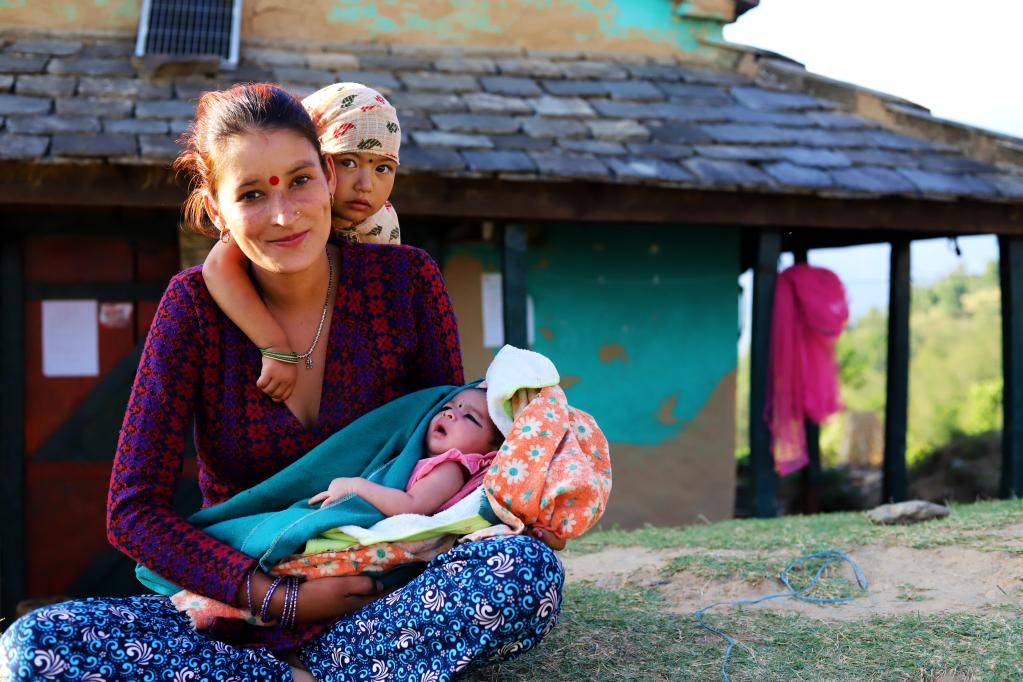
Story
27 June 2025
Building an inclusive economy through women-led businesses
At dawn in Belauri Municipality, northeastern Nepal, the rustle of vegetable leaves and the hum of water pumps signal the start of another productive day for Nisha Devi Chaudhary. Once dependent on her husband’s migrant remittances, she now grows seasonal vegetables like cabbage, chilies and tomatoes on her family’s land, which spans about 1,000 square metres.After completing a vocational training in vegetable farming supported by the Empowered Women, Prosperous Nepal (EWPN) programme, she gained new agricultural skills, access to organic inputs and market information. Today, she earns USD 260 to 300 per month, an increase in income after EWPN’s intervention. She is now planning to lease more land to expand her farm.“I no longer wait for money to come from abroad. I am earning with my own hands and feeding my family with what I grow,” she says, standing proudly next to her in-progress tunnel farm, partially funded by a seed grant from the programme. Chaudhary’s story is not just a personal triumph, it is emblematic of a broader shift sweeping across Nepal. As the country prepares for graduation from Least-Developed Country (LDC) status in 2026, its path to inclusive economic growth increasingly hinges on the empowerment of women like her. And the role of micro, small and medium enterprises (MSMEs), particularly those led by women, is central to this transformation. Anchored on SDG 5 (on gender equality), SDG 8 (on decent work and economic growth) and SDG 10 (on reduced inequalities), Nepal’s transition will only be sustainable and irreversible if it is gender responsive.Across Madhesh, Karnali and Sudurpaschim Provinces, women’s voices are influencing local economic decisions, shaping municipal plans and claiming their space in markets. In Belauri, a group of 16 women has turned a local opportunity into an enterprise by producing traditional sweets and snacks near the scenic Shova Lake, linking their products to the region’s emerging tourism value chain. Supported by the EWPN programme with training and business coaching, the group has also formed a savings and credit association to reinvest in their venture.“We save every month and decide together how to grow our business. This is not just about income, it is about our unity and our decision-making power,” shares Rita Chaudhary, one of the women entrepreneurs.In Birgunj, a group of 20 women trained in stitching now produce school uniforms in a workspace constructed and equipped by their local ward office. Their products are directly linked to the Government’s school uniform distribution programme, providing them with stable income while fulfilling a public need.“Before, I used to earn a little. Now, I work full-time with dignity. My uniform goes to children who could not afford one otherwise. That makes me proud,” says Khusboo Kumari Patel, a member of the stitching group.These achievements reflect the systemic change that EWPN was designed to catalyse. As of May 2025, 569 women, primarily from marginalized and underserved communities out of 1,500 targeted participants across the three provinces have received Council for Technical Education and Vocational Training-certified vocational training in agriculture, textile, arts and food-based trades complemented by business coaching, seed funding and market linkages support. Many of them come from historically marginalized communities: Dalit, Janajati, Muslim, Madhesi and returnee migrant households with limited income, land and formal education. Of the 136 women trained through the programme, 39 per cent have already launched or expanded income-generating activities with support from local institutions and value chain actors.Beyond economic gains, EWPN-supported opportunities are shifting social dynamics and power relations within households and communities. As women begin earning and contributing to household income, they are stepping into new roles as decision-makers and community leaders.“Once I started earning, I found the confidence to speak up at home and in community meetings. Now, I feel my voice is heard,” says Saraswati Sunar, from Birendranagar, who now co-manages a collective turmeric farm after training through the EWPN programme. “This used to be the shed where I stayed during menstruation, isolated because of an old tradition,” says Khagisara Acharya Karki, a poultry farmer from Dailekh. “Now, it’s where I raise chickens and run my business. EWPN didn’t just help me earn, it helped me leave behind a harmful practice and reclaim my space.”Several women have gone on to lead savings groups, advocate for community services and represent their cooperatives in local dialogues. In doing so, they are actively influencing decisions that affect their lives and communities. By positioning women as visible economic actors, the programme is not only strengthening the economic security and rights of women but also challenging entrenched gender norms.To enable this shift, EWPN partners with federal, provincial and local governments to embed inclusive economic models into policy and practice. In Dhangadi, for example, the local government launched a weekly women’s market, offering 75 stalls to women entrepreneurs from informal sectors. Technical support from EWPN ensured gender-sensitive design and operational guidance, turning policy into real economic opportunity.The programme also facilitated the provision of equipment through local cooperatives and farmer associations, promoted digital finance training and supported inclusive planning processes ensuring that women were not just beneficiaries but co-creators of their communities’ economic future.With continued commitment, these systemic supports will ensure that gains made under EWPN become a springboard, not a ceiling, for Nepal’s inclusive growth.In Birendranagar, Sushila Tharu stands at the doorway of the Patalganga Tharu Community Homestay, welcoming visitors with quiet pride. For over six years, the initiative has not only created income, but built identity and dignity for Tharu women in her community. Through the EWPN-supported 18-day hospitality and culinary training, she and other women enhanced their skills, experimented with authentic Tharu recipes, and deepened their understanding of cultural tourism.“I no longer have to ask my husband for money,” she says. “This homestay has shown our community and ourselves that when women are given the opportunity, we lead.” Looking beyond 2026, UN Women Nepal envisions a resilient national economy where women-led MSMEs are not exceptions, but anchors.About the programme: Empowered Women, Prosperous Nepal is a four-year joint initiative (2023–2026) by the Government of Nepal, the European Union and the United Nations to advance gender equality and inclusive economic growth. The programme is implemented by four UN agencies (ILO, UNFPA, UNICEF and UN Women) across Madhesh, Karnali and Sudurpaschim Provinces, in close partnership with all levels of government.
1 of 5
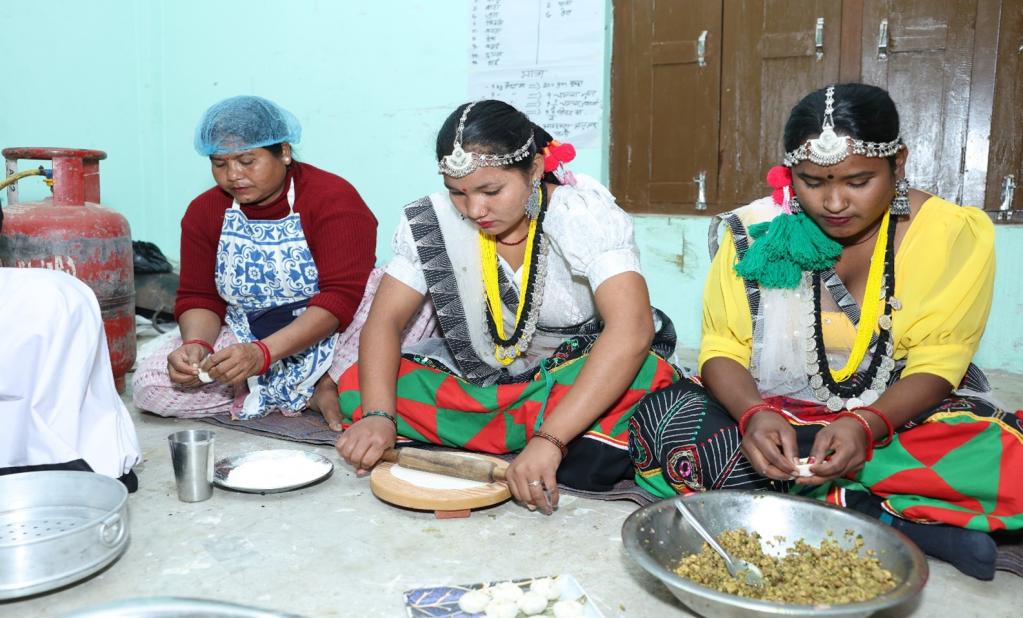
Story
30 December 2024
From Bondage to Business:
In the heart of Kanchanpur’s Belauri Municipality, 16 determined women historically marginalized Kamaiya group—have rewritten their futures with the sizzling sounds of snacks and sweets. Until recently, these women had limited opportunities. The remnants of the Kamaiya bonded labour system still cast long shadows, restricting their access to resources and economic independence. But change began to take root in late 2024, when the Empowered Women, Prosperous Nepal (EWPN) programme joined hands with Belauri Municipality, the Sobhataal Protection Group, and local leaders to support the economic empowerment of these women These women recently completed a 1.5-months intensive training in fast food preparation, thanks to a partnership between the EWPN, local government and the Sobhataal Protection Group. These aspiring entrepreneurs were not just learning to cook; they were learning to dream. With support from EWPN, and leadership of Ward Member Kripa Ram Chaudhary and Ward Chairman Lal Bahadur Chaudhary, the women were equipped with culinary skills, confidence, and hope. Sobhataal—once just a local secret—is emerging as tourism destination which is also prioritized in the plan of the local government. With rising visitor numbers came a glaring gap: no food outlets to serve hungry travellers. Seizing the opportunity, EWPN in partnership with Belauri Municipality, ward no-5 stepped in with the interventions: empower local women to start fast food counters right at the lake. EWPN provided cooking equipment and kitchen utensils, forming the “Sobhataal Women Entrepreneur’s Group” which was further complemented by local government through other logistics support equivalent of NPR 100,000. With this support, the women—once limited by systemic barriers—are now running business, serving freshly made snacks to weekend crowds. It’s not just a business; it’s a movement-says the leader of the ‘Sobhataal Women Entrepreneurs’ group. According to her, they are running the business everyday where they take charge of business on a rotational basis. Average weekly income of NPR 5000 Inspired by the group business, two of the training participants from other ward also started similar business, embarking on their entrepreneurial journey. These women are setting role models for the rest of the community women to step out from their household chores and join labour market for increased voice, agency and choice. The Belauri Municipality prepares for an official inauguration of the weekly market in Shobataal to provide market opportunity for local produce for more women from the community. This upcoming event aims to spotlight not just economic empowerment, but the transformative power of community-led development. With plans to expand services to weekdays and draw in more local tourists, these women are becoming symbols of resilience and innovation. Sobhataal is no longer just a place of natural beauty—it’s a stage where women rise, lead, and thrive. Looking ahead, the story doesn't end here. Building on this momentum, UN Women plans to work closely with the International Labour Organization (ILO) to help these and other aspiring women entrepreneurs strengthen their businesses. Women who show interest and readiness will be supported through ILO’s “Start and Improve Your Business (SIYB)” training, providing them with practical tools and guidance to grow and sustain their enterprises.
1 of 5
Story
27 December 2024
Turning Skills into Prosperity: Empowering Women Entrepreneurs in Belauri
"It makes us happy to see the fruits of training being implemented," says Naresh Prasad Bhatta, Employment Coordinator and SIYB (Start and Improve Your Business) Facilitator for Belauri Municipality, Sudurpachim.Naresh and Dipa Raut, an Entrepreneur Development coordinator, attended a 10-day SIYB Training of Trainers (ToT) in Dhangadhi. The training, conducted under the Empowered Women, Prosperous Nepal (EWPN) program led by the ILO in collaboration with the Ministry of Social Development, aimed to equip participants with essential entrepreneurial skills to empower local women entrepreneurs. Following their training, the ILO and Belauri Municipality organized an SIYB session in Belauri-5, Attariya, where 22 women from the community participated. Many of these women were involved in vegetable farming and traditional tapari (leaf plate) production but lacked the knowledge to transform their work into sustainable, profit-oriented businesses. One of the participants, Phulkumari Rana, had been a vegetable farmer for years but never saw it as a potential business. "Through the training, I learned the importance of setting profit margins, practicing seasonal farming, and understanding market demands," she shared. "I was earning just enough to get by, but now I know how to calculate profits, save, and expand my business."The impact of the training was immediate and transformative. Women in the community who were engaged in tapari production received tapari-making machines from the municipality. With renewed confidence and skills, they are now planning to market their products across Dhangadhi, aiming to generate greater income and improve their livelihoods. Under the EWPN program—a collaborative effort between the Government of Nepal, the European Union, and the United Nations—the ILO capacitated province and municipal government trainers who now mobilize their funds to deliver business development support to budding and existing entrepreneurs from local communities, as well as referees from EWPN partner agencies. The Naresh Bhatta and Dipa Raut trainer were used by UN Women to train vegetable farmers on SIYB with backstopping from an ILO master trainer. With their newfound entrepreneurial skills, they are not only changing their own lives but setting an inspiring example for future generations of women entrepreneurs in Sudurpaschim.
1 of 5
Story
26 December 2024
Breaking the Cycle: Kamala and Saraswati's Journey from Tradition to Transformation
Early marriage was simply a part of life for Kamala Khadka. She herself was married at just 11 years old to a boy barely four years older. Growing up, she never questioned the practice—it was considered normal in her community. So, when her 15-year-old daughter Saraswati upset her, Kamala’s go-to threat was always the same: "I’ll marry you off and let you face what marriage brings."Those words stung deeply. "It hurt me every time she said that" Saraswati recalled with sadness.Everything changed when Kamala joined the Rupantaran parent’s sessions under the Empowered Women, Prosperous Nepal (EWPN) initiative, facilitated by UNICEF. This program was designed for parents of students attending Rupantaran sessions in schools to discuss and reflect on issues affecting young girls, including the struggles of early marriage.During these sessions, Kamala learned from facilitators and other parents that child marriage not only violates the law but can have devastating consequences. For the first time, she connected the hardships she had endured in her own life to early marriage. "I lost my husband when I was very young and had to raise three children on my own. If I had been educated, I could have earned enough to support my family, but marriage robbed me of that chance. Instead, I was burdened with household chores and faced immense mental stress," shared Kamala. "Now I realize that marrying Saraswati off won’t solve problems, it will only ruin her future. Considering the facts, I’ve stopped pushing for early marriage and want better for her."Meanwhile, Saraswati, now in Grade 9, regularly attends the Rupantaran sessions. These sessions teach students about the harms of early marriage, equality, and mutual respect among peers. "One day, I want to become a teacher and conduct Rupantaran sessions just like this to raise awareness about early marriage," says Saraswati. The mother and daughter both now share conversations about what they learn from their respective sessions, deepening their bond and reshaping their outlook on life.Child marriage continues to be practiced in various parts of Nepal, robbing children—especially girls—of their rights, education, and future opportunities. To combat this harmful tradition, the Empowered Women, Prosperous Nepal (EWPN) programme, a joint effort by the Government of Nepal, the European Union, and the United Nations, is supporting Rupantaran parent’s sessions and Rupantaran life skills sessions across the across multiple municipalities in the Karnali, Sudurpaschim, and Madhesh provinces.The initiative not only raises awareness about key social issues but also aims to equip school dropouts with skill development training through programs led by UN Women and ILO.
1 of 5
Story
25 December 2024
Empowering Women Survivors of Gender-Based Violence: Stories of Strength and Hope
Dikshya (pseudonym) endured years of physical and emotional violence after giving birth to a daughter. "Having an alcoholic husband ruined my life," she recalled. The abuse she faced during her first pregnancy tragically led to the death of her unborn child. Despite repeated counseling sessions, her husband never changed, and Dikshya began losing hope for a better future for herself and her child. Her thoughts changed when she visited a health center for her daughter’s vaccination. There, she learned about the One-Stop Crisis Management Center (OCMC) and Safe House services, as well as the various forms of gender-based violence (GBV). Realizing that the abuse she had normalized was indeed violence, Dikshya decided to seek help at the OCMC. The counseling she received empowered her to rebuild her life. She was also enrolled in a sewing skills training program to support her journey toward economic independence. Similarly, Situ (pseudonym) was married at the age of 13 after being raised by her grandparents, who hoped marriage would secure her future. Instead, her life took a tragic turn as her husband subjected her to severe abuse, once nearly beating her to death. Desperate to escape, she sought help at the OCMC, where she was referred to a Safe House. At the Safe House, Situ joined other GBV survivors in learning sewing skills. "I no longer feel alone. I have a team here, and if I learn well, I can earn for myself," she shared with hope in her voice. Through OCMC's support, she also received critical medical treatment for uterine issues at Dadeldhura Hospital. Both Dikshya and Situ now dream of opening tailoring businesses to become financially self-reliant. Janaki Singh, Case Manager and Counselor at OCMC, emphasized the importance of raising awareness about GBV. "Many women believe being beaten by their husbands is normal. We need to educate them that every woman has the right to feel safe," she said. The OCMC and Safe Houses, supported by UNFPA under the Empowered Women, Prosperous Nepal (EWPN) program, provide crucial support for GBV survivors. Women in these shelters not only receive counseling but are also referred for skill development training, such as tailoring and beauty services. UNFPA collaborates with UN Women and ILO to link survivors to economic opportunities and market opportunities. This multi-agency effort, under the EWPN program—a joint initiative of the Government of Nepal, the European Union, and the United Nations—aims to empower women like Dikshya and Situ, helping them regain dignity, independence, and a brighter future.
1 of 5
Press Release
05 January 2026
UN in Nepal Advances Efforts to Survivor-Centered Protection from Sexual Exploitation, Abuse and Harassment Across Government Ministries
As part of this effort, UN Nepal, through the UN PSEA Working Group, convened a high-level PSEAH workshop for Joint Secretary from across the Government of Nepal, in collaboration with the Ministry of Women, Children and Senior Citizens and with funding support from the International Organization for Migration (IOM). The workshop brought together more than three dozen senior government officials and UN agencies to strengthen collective understanding of PSEAH and to translate policies into practical, operational actions. Opening the workshop, Ms. Hanaa Singer Hamdy, the United Nations Resident Coordinator in Nepal said, “The urgency of this work is clear. Sexual exploitation, abuse and harassment disproportionately affect women and girls, undermine trust in institutions, weaken service delivery, and ultimately erode social and economic resilience. Addressing these risks is central to Nepal’s national priorities—accelerating the SDGs, strengthening accountability and transparency, and ensuring social protection systems genuinely safeguard the most vulnerable.” She added. Hon’ble Justice Ms. Sapana Pradhan Malla encouraged ministries to identify clear entry points for integrating PSEAH into operational frameworks. She further urged participants to develop practical recommendations with clearly defined roles, timelines, and accountability mechanisms. Women’s rights activist and UN Convention on the Elimination of All Forms of Discrimination against Women (CEDAW) Committee Member, Ms. Bandana Rana underscored the importance of aligning UN mechanisms with state responsibilities and national priorities, while strengthening transparency and accountability across public institutions. Participants identified practical entry points to integrate PSEA and the Sexual Harassment at Workplace (Prevention) Act into sectoral planning, institutional procedures and local-level service delivery, with a focus on prevention, clear reporting pathways and survivor-centered responses. A panel discussion led by Dr. Krishna Hari Pushkar, Secretary at the Ministry of Labour, Employment and Social Security, and Mr. Parashwor Dhungana, Secretary at the Ministry of Law, Justice and Parliamentary Affairs, highlighted existing strengths within government policies and institutional frameworks, including critical gaps in addressing SEAH risks faced by migrant workers across different stages of migration. Building on Nepal’s national legislation particularly the Sexual Harassment at Workplace (Prevention) Act 2071, the workshop focused on strengthening PSEAH systems in practice by embedding safeguards into staffing arrangements, institutionalizing training, and expanding community-based complaints, safe and accessible reporting, and victim-centered response mechanisms. # Notes to the editor: PSEAH is a core global priority of the United Nations system, guided by the UN Secretary-General and the Inter-Agency Standing Committee (IASC) Six Core Principles. These frameworks underscore zero tolerance for sexual exploitation, abuse and harassment, survivor-centered responses, accountability, and robust prevention mechanisms in both workplace and service delivery contexts. These commitments are further reinforced through the United Nations Sustainable Development Cooperation Framework (UNSDCF), which calls for the mainstreaming of PSEA measures across all UN-supported programming. For more information, please contact:Tej Maya Dangol, UN PSEA Coordinator; UNRCO Nepal, tej.dangol@un.orgPratibha Rijal, Project Officer (PSEA) IOM Nepal, prijal@iom.intDipti Shah, Communications Focal Point; IOM Nepal, dshah@iom.int
1 of 5
Press Release
17 December 2025
Seventy Years of Partnership, Eighty Years of Multilateralism: Nepal and the United Nations Celebrate a Shared Legacy of Impact, Peace, and People
This milestone traces back to 14 December 1955, when Nepal formally became a Member State of the United Nations — a decision that laid the foundation for seven decades of cooperation in service of the Nepali people and the global community. Held at UN House, the UN Day 2025 celebration was exceptionally high-level and marked by strong national ownership. The Rt. Honourable Prime Minister of Nepal, Madam Sushila Karki, five Cabinet Ministers, the Chiefs of all security agencies, members of the diplomatic corps, development partners, civil society, and the United Nations Country Team came together to reflect on the partnership’s history and on what seven decades of cooperation have delivered for Nepal — and for the world. In her address, the United Nations Resident Coordinator underscored that the UN was founded on a historic choice — cooperation over division, hope over despair, and peace over power — emphasizing that peace is not the dividend of development, but its foundation. Reflecting on 70 years of UN–Nepal partnership, she highlighted progress in poverty reduction, maternal health, education, water and sanitation, forest restoration, renewable energy, and post-2015 earthquake recovery, and thanked the Government of Nepal, partners, and UN colleagues for keeping people at the centre of delivery. The celebration also underscored Nepal’s long-standing contribution to global peace. As one of the world’s leading troop-contributing countries, Nepal has deployed generations of peacekeepers to some of the most fragile contexts, embodying the UN’s founding principle of collective responsibility. Speaking at the ceremony, the Chief of Army Staff General Ashok Raj Sigdel highlighted Nepal’s peacekeeping legacy as a reflection of national values — service, sacrifice, and solidarity. From post-war reconstruction and institution-building to disaster response, health, education, gender equality, climate action, and inclusive development, the UN–Nepal partnership has evolved alongside the country’s needs. What began as technical support has grown into community-driven change, grounded in local leadership and national priorities. In her inaugural address, Rt. Hon Prime Minister Sushila Karki highlighted the partnership between the UN and Nepal and reaffirmed Nepal’s belief in multilateralism, emphasizing that cooperation remains the strongest path to peace, dignity, and shared progress. The programme included the mural, featuring “UN Nepal 70” expressions in 14 languages and scripts, including Braille, reflecting Nepal’s linguistic diversity and marking the country’s first publicly accessible mural for persons with blindness. T he celebration also included a wreath-laying ceremony at the Peacekeepers’ Memorial, where the Prime Minister, Ministers, Chiefs of all security agencies and the UN Resident Coordinator paid tribute to the 87 Nepali peacekeepers who lost their lives in service to peace and humanity.# For more details, please contact: Simrika SharmaNational Information OfficerUN Information Centre, Kathmandu Email: simrika.sharma@un.org
1 of 5
Press Release
25 November 2025
Digital Violence Is Real Violence: UN Nepal Calls for Action as 16 Days of Activism Begins
Today, the United Nations in Nepal kicked off the 16 Days of Activism Against Gender-Based Violence together with the Hon’ble Minister for Communication and Information Technology Mr Jagdish Kharel, reaffirming Nepal’s commitment to making digital spaces safer for women and girls. This year’s global theme, Unite to End Digital Violence against All Women and Girls, underscores the urgency of protecting young people in rapidly expanding digital spaces. Speaking at the event, the Honorable Minister Kharel emphasized the need of having safe, inclusive and empowering digital ecosystem for every nepali citizen. He noted that, “digital safety is now central to civic participation, access to information and the full exercise of rights in Nepal’s evolving digital landscape.”The event brought together government representatives, UN agencies, development partners, youth networks, civil society, private sector, and media under one clear message: Digital violence is real violence. Online abuse, sexual extortion, non-consensual sharing of images and the spread of misogynistic content inflict real harm on the lives, dignity and autonomy of women and girls. Speaking on behalf of the United Nations in Nepal, Resident Coordinator Hanaa Singer-Hamdy underscored that digital violence is not only an attack on the rights, dignity and autonomy of women and girls but a direct threat to their participation in public life. She warned that online abuse is silencing women journalists, discouraging women leaders, and pushing girls away from digital spaces where their voices are urgently needed. Protecting women and girls online therefore demands a whole-of-society effort to challenge harmful norms, strengthen accountability, and invest in systems that safeguard digital rights. She further highlighted the urgency of digital literacy and online safety education for adolescents—especially boys—to build resilience, transform attitudes, and promote respectful online behaviour.”The event featured a youth-designed mural symbolizing collective commitment to reclaiming safe digital spaces, along with a fireside chat with influencers and digital rights experts on the rise of online abuse and the urgent need for stronger protections.Young participants shared their experiences of online harassment and the importance of being believed, supported and empowered to live a safe digital life. They asked better support systems for survivors, addressing impact of harmful content and building platforms that are safe for women and girls.The UNiTE 2025 campaign runs until 10 December, under the theme “UNiTE to End Digital Violence against All Women and Girls” urging everyone to stand together against digital violence and uphold digital rights as fundamental human rights. The campaign calls on parents, educators, policymakers and technology companies to take shared responsibility for creating online environments where all women and girls can learn, participate and thrive without fear. For queries, please contact; Simrika Sharma; Tel: 9841592692 Email: simrika.sharma@un.org Sangharsha Pant; Tel: 9849624191 Email: sangharsha.panta@unwomen.orgAditi Aryal; Tel: 9849541479 Email: aryal@unfpa.org Editor’s Note The 16 Days of Activism against Gender-Based Violence is an international campaign which takes place each year. It commences on 25 November, the International Day for the Elimination of Violence against Women, to 10 December, Human Rights Day. It was originated by activists at the first Women's Global Leadership Institute in 1991 and is coordinated each year by the Centre for Women's Global Leadership. It is used as an organizing strategy by individuals and organizations around the world to call for the prevention and elimination of violence against women and girls.As a unifying theme running global activities, the UNiTE campaign has utilized the colour orange to represent a brighter future, free from violence against women and girls. For the past years, the UN Country Team (UNCT) in Nepal has been marking 16 days campaign with awareness building and advocacy campaigns across Nepal. Some of the key activities undertaken were ‘oranging’ monuments and provincial buildings, engaging audience across Nepal through films, social media, and radio campaigns.
1 of 5
Press Release
09 September 2025
STATEMENT BY THE UNITED NATIONS IN NEPAL
The United Nations in Nepal is deeply pained by the tragic loss of lives, the rising tensions and the escalating violence across the country. We extend our heartfelt condolences to the families of those who have lost loved ones and wish a full and speedy recovery to the injured.Freedom of expression, access to information and peaceful assembly are fundamental rights protected under Nepali and international law. We call on all protestors to exercise these fundamental freedoms peacefully and refrain from violence. At the same time, we urge the authorities to ensure that all law enforcement responses remain proportionate and in line with international human rights standards. All allegations of excessive use of force should be investigated promptly in an independent, transparent and impartial manner.Dialogue remains the best means of addressing the concerns of citizens, including the country’s young people. The voices of young Nepalis have been heard loud and clear, and Nepal will benefit from taking concrete steps to address the root causes of the issues raised and ensuring a prosperous future for young Nepalis. The United Nations stands ready to support dialogue and trust-building measures that can help de-escalate tensions and contribute to a peaceful resolution for prosperous Nepal.
1 of 5
Press Release
11 July 2025
Nepal’s Largest All-Female Hackathon 2025: Shequal Foundation and EWPN Unite to Empower Women Through Innovation
The residential hackathon brought together 16 all-women teams of 48 participants selected from across the country to address some of Nepal’s most pressing social and economic challenges through technological solutions. The hackathon, themed “Hacking for Empowered Women,” focused on key issues such as unpaid care work, access to financial services, digital literacy, and gender-responsive health. From July 9-10, participants engaged in intensive collaboration, coding, mentorship, and problem-solving, supported by 20 expert mentors and industry professionals. The event culminated with a final pitch day by six teams who presented their innovative tech solutions to a panel and following three teams were announced as winners: Winner: SewaDit They developed an innovative digital platform that empowers women by tracking unpaid care work through task-based points, verification, and monthly reports making invisible labor visible for recognition, support, and economic inclusion. They were from Butwal, comprising Ms. Roshni Neupane, Ms. Aakritee Parajuli, and Ms. Supriya Shrestha First Runner-Up: Healing Hands They created a solution titled “Care Bridge”, which is a web platform that connects female caregiving students with those in need of unpaid care, matching based on skills and availability, while tracking experience in a verifiable Care Portfolio to provide real-world training, community support, and resume-level recognition.developed by a team from Jhapa, comprising Ms. Aiswarya Pokharel, Ms. Ayushma Pokhrel, and Ms. Hemkala Thapa Second Runner-up: June They developed a solution called HeritEdge which is a personalized, gamified cultural storytelling platform like Netflix for heritage that empowers local artists, engages youth with AR and AI-driven experiences, and enhances immersion through regional language support developed by a team from Kathmandu, comprising Ms. Kritika Acharya, Ms. Astha Ghimire, and Ms. Simran Gurung The teams presented solutions addressing real-world challenges, including care gaps, low female employment, skilling and employment opportunities, digital finance and budgeting tools, gender-responsive healthcare, digital inclusion and accessibility to e-commerce platforms, to cultural preservation using AR, and recognition of unpaid care work. These ideas, developed with empathy and purpose, which aimed to drive long-term change for women in Nepal were judged by esteemed judges, Mukesh Regmi, Joint Secretary, Ministry of Information and Communication Technology, Bhawani Rana, Former President, FNCCI, Aashish Dhakal, Global Equity Fund, Pramila Acharya Rijal, South Asian Women Development Forum, Mona Sherpa, Care Nepal, Tripti Rai, Oxfam, Rajendra Luitel, IFC, Salina Nakarmi, f1soft, Pranisha Shrestha, NMB and Sahana Bajracharya, Media Personality who represented different government institutions, development agencies, and the private sectors. Quotes: Her Excellency Veronique Lorenzo, Ambassador of the European Union to Nepal: “At the European Union, we firmly believe digital innovation plays a vital role in economic growth, particularly in women’s economic empowerment. Yet, this innovation must be accessible and affordable to everyone, especially to the most marginalised communities amongst us. We have supported the hackathon because it provides a platform for women to design and lead digital solutions that reflect their real-life experiences. By investing in women’s participation in the tech sector, from Kathmandu to rural Nepal, we are not only addressing gender disparities but also unlocking powerful engines for economic and social transformation." Patricia Fernandez-Pacheco, Country Representative, UN Women Nepal: “When women design the future, the future becomes more equal, creative, and powerful for all. This Hackathon is not just about technology, it’s about rewriting the rules, closing the gender digital divide, and ensuring every girl and woman has a voice in shaping tomorrow.” Melisha Ghimire & Astha Sharma, Co-Managing Directors, Shequal Foundation: “This hackathon is more than a competition; it’s a movement. A movement to place young women at the center of innovation, leadership, and impact. We’re not just building tech solutions; we’re building belief, visibility, and power.” The hackathon followed a series of impactful pre-events, including IDEATHON 2025, a Human-Centered Design Workshop, and Hack the Narrative, which engaged over 1000 young women in ideation, storytelling, and user-focused innovation. UN Women provided technical leadership to design and execute the Hackathon on the theme ‘Women’s Economic Empowerment, including unpaid care work. This initiative marks a bold step in building inclusive digital ecosystems where women can lead, innovate, and thrive. For media inquiries and further information, please contact: Name: Riya Shrestha Phone: 9801911640 Email: riya.shrestha@shequalfoundation.org —-------------------------------------------------------------------------------------------------------------------------- About Organizers: About EWPN Empowered Women, Prosperous Nepal (EWPN) is a four-year joint initiative (2023–2026) by the Government of Nepal, the European Union, and the United Nations to advance gender equality and inclusive economic growth. The programme is implemented by four UN agencies (ILO, UNFPA, UNICEF, and UN Women) across Madhesh, Karnali, and Sudurpaschim Provinces, in close partnership with all levels of government. Shequal Foundation Shequal Foundation is a youth-led, women-driven non-profit organization committed to building an inclusive, equitable, and just society. Shequal Foundation works across all 7 provinces of Nepal, engaging individuals, especially girls and women between the ages of 9 to 40, through its diverse programs and initiatives. With a strong focus on gender equality, economic empowerment, and community transformation, Shequal creates safe spaces and opportunities for girls and women across Nepal to lead, learn, and thrive. From grassroots initiatives to national campaigns, Shequal blends innovation with advocacy to challenge norms, shift narratives, and spark systemic change.
1 of 5
Latest Resources
1 / 11
Resources
24 November 2025
Resources
10 January 2024
Resources
23 January 2023
1 / 11

